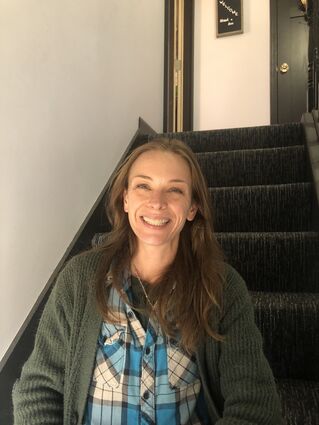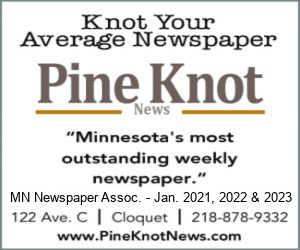From the editor: Nonprofit expands reach toward preventing addiction
October 22, 2021

Jana Peterson
Sarah Mangan is coordinating efforts by REACH to focus on preventing drug and alcohol misuse by young people. In the next five years, it will use funds from a $920,000 grant from the Minnesota Department of Human Services.
Although its roots are in mentoring, Cloquet's nonprofit REACH organization has been evolving to meet community needs from the beginning. A $920,000 grant from the Minnesota Department of Human Services is now speeding up that evolution. The grant money is specifically targeted at measures to reduce drug and alcohol use through positive community norms over the next five years. The goal is to come up with positive activities, people and ways students can spend their time other than using drugs and alcohol.
Once the grant was awarded in July, the first step was hiring a full-time grant coordinator. After a selection process that included interviews with Minnesota Department of Human Services and REACH staff and the REACH youth advisory board, Sarah Mangan was hired to work with the current REACH staff, including executive director Dakota Koski and program coordinator Anne Parish, among others.
With an education in social work and sociology, Mangan has worked with people at various stages of the treatment spectrum, from crisis intervention through outpatient treatment, largely working one on one with people experiencing crisis. With this job and the help of the SOS groups already started by REACH in each Carlton County school, she hopes to prevent those issues arising for any more people.
I sat down with Mangan this week to meet her and find out more about positive community norms and goals of the grant program.
QWhat appealed to you about this job?
AAn ounce of prevention is worth a pound of cure. My heart's belief is that if we can assist in preventing problems from happening, or redirecting people towards healthy behaviors, we can avoid so much suffering, not just for the individual, but for their family, friend group and the community. Because the issue of substance abuse is not only affecting the person who's using - it affects all of us. So when individuals can make healthier behavior choices, it has a positive impact that ripples out.
QWhat are positive community norms anyway?
APositive community norms focus on identifying what's positive, and what's working in our communities, and using vested parties - parents, teachers, students, community members - to work together to grow the positive. Positive community norms reinforce the positive that is actively happening in the community.
QSo how do you use a positive to tell kids not to drink or take drugs?
AWhen we focus on the negative, the negative tends to increase. If we put up billboards, they would say things, based on data, to the tune of "most Cloquet and Carlton students choose not to drink when they're with their friends." Instead of "don't do something," it's "this is what most people are doing." We talked a lot about the fear tactics of the 1990s and thinking if we gave people lots of scary information, it would dissuade them. What the research actually found is that it interested some people who were on the edge - it made them more interested than more afraid. And it led to negative outcomes. But this grant, this science says, we can also focus on the things that are working. The positive messaging is to highlight the good. You tend to hear about the one kid who did something bad, you don't hear about the 87 other people who showed up and did what they were supposed to do. So we're saying, let's celebrate the 87 and support them too. The concerns are still very real, but so is the hope.
QThis is a five-year grant cycle. Where are you in that cycle right now?
AWe are on step one, which is planning and environmental advocacy. Our task right now is to observe what's happening in the community. I'll be reviewing data from the 2019 Minnesota student survey to sort of get a baseline of what's been happening recently. And there's a Carlton County Drug Prevention Coalition that was in existence before this grant happened, so we're reaching out to those people. I imagine there'll be a subgroup that will be focused on positive community norms. We're basically in the very beginning of coalition building.
QSo you will be reaching out to and working with young people so they can get in on the ground floor of building this program. How can adults get involved in this process of making our community a safer place for youth and all of us?
AI would say, please get involved. These students right now are future leaders and our future caretakers. This community belongs to all of us.
The first thing that you can do is call or talk to your neighbors, come to our coalition meetings, start looking around in your community for what's working. Get involved with local civic groups, faith communities, and other community partners. Every contribution makes a difference. Whether that's cleaning up garbage on your block, or reaching out to a young person, coaching a team, whatever it is, there's so many ways to get involved.
There's a lot of active engagement of adults in our community and a lot of stuff happening at the schools. My big hope is that we can just get our arms around all of it, because we are all in this together. And that's kind of the spirit of the grant, the science of the positive, is that there's already good here, there's already so much working, and we want to elevate that.
As more calls to action occur, we will be letting the community know. In a long-term process like this, this part can be hard to get a handle on, the evaluating sort of behind the scenes. But it's so vital that the community be aware of this and know that we're going to need their help.
Want to know more? Read "Nonprofit expands its 'REACH' in a big way," published in the Pine Knot on 8/6/2021 or visit http://www.reachyap.org. Want a more personal interaction? Call 218-451-0183 or 218-499-4293 or stop by the office upstairs at 1001 Stanley Ave. in Cloquet.







